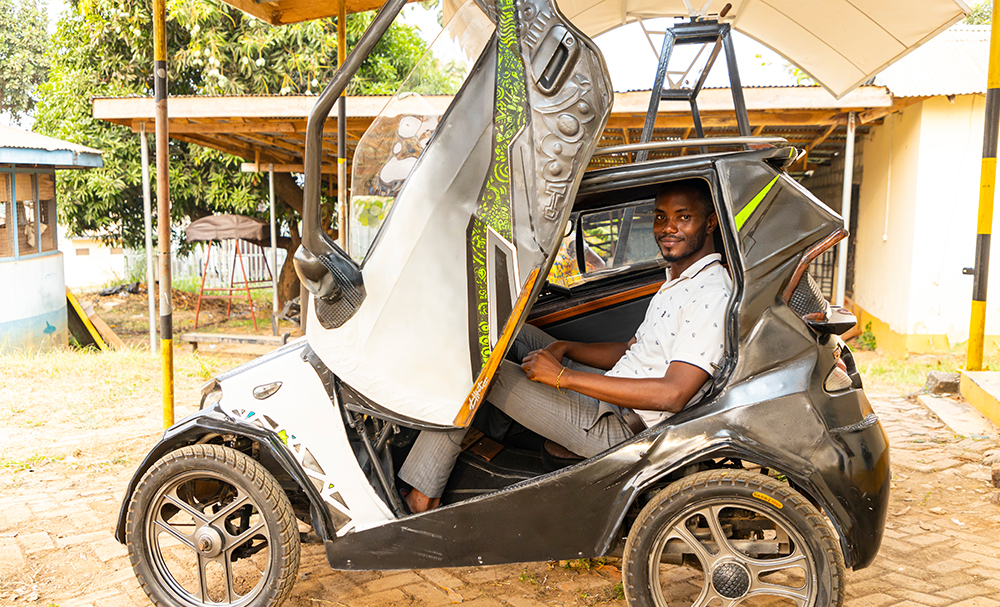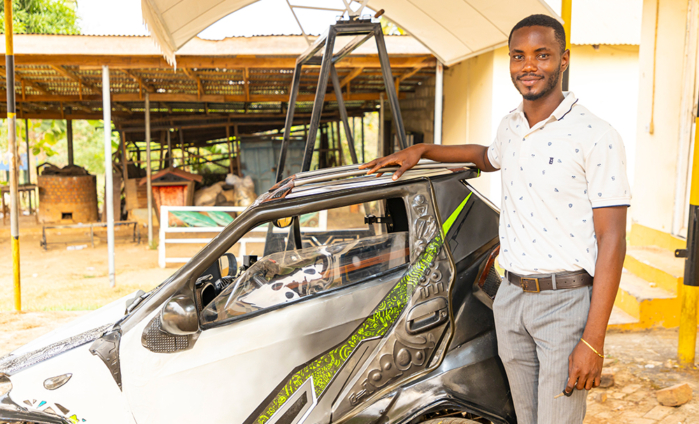Despite the global recognition of Science, Technology, Engineering, Arts and Mathematics (STEAM) education, Ghana’s education system has yet to fully embrace models that effectively integrate STEAM competencies into practical projects. An initiative by Benjamin Ansah, a Ph.D. Art Education student at the Kwame Nkrumah University of Science and Technology (KNUST), is set to change this narrative.
Benjamin has constructed a cycle car as part of his project titled “STEAM in Ghanaian Higher Education: Modelling STEAM-Related Competencies of Students Through Cycle Car Technology.”
Mr. Ansah describes his project as a conceptual movement aimed at fostering interdisciplinary education in Ghana. According to him, the vehicle embodies the essence of STEAM by incorporating elements from various disciplines, such as mechanical and electrical engineering and material science.
“Every discipline here in KNUST depicts itself in this vehicle: from the mechanical to the electrical and materials. If we want to have an inclusive education, we can use this vehicle for an example. That was the motive for the vehicle in the first place, aside from tackling the student mobility system. The main concept was to showcase the educational aspect – that it is possible for these disciplines to come together to create something like this,” Ansah explained.
This innovative approach highlights the practicality of STEAM education and also addresses a key challenge in Ghanaian universities: student mobility. Ansah elaborated on the advantages of the cycle car over traditional modes of transport, such as bicycles or motorbikes.
“In terms of the weather, when it’s raining, there is cover. It is well secured,” he said.

Mr. Ansah’s supervisor, Dr. Kafui Kwasi Agyeman, emphasised the project’s broader implications for Ghana’s educational system. He described it as a critique of the country’s predominantly linear educational structure and advocated for a more collaborative approach to problem-solving.
“We are supposed to tease our educational system. We have a linear form of education. There should be a convergence where different people come together, think together, and capitalise on individual strengths to solve problems. This approach is better than having one person tackle a problem individually,” Dr. Agyeman stated.
He further highlighted the importance of multidisciplinary collaboration in addressing complex challenges. “When people with different backgrounds come together, complex problems are solved,” he added.
Dr. Agyeman attributed Ansah’s ability to undertake this ambitious project to his diverse training background. “This guy is able to do this because he has multidisciplinary training. His father is an engineer, and he had some training under him in a multi-material disciplinary system. He also went through a system where he engaged in a lot of woodwork, bringing different competencies on board. That’s how it’s able to happen,” he explained.
The work was supervised by Professor Harry Barton Essel, Dr Kafui Kwesi Agyeman, and Dr Frank Kwabena Afriyie Nyarko.
Latest Stories
-
Abuakwa South MP donates GH¢45,200 to support feeding at Kibi School for the Deaf
6 minutes -
‘Just the beginning’ – Finance Minister Ato Forson hails Fitch ratings boost for Ghana
28 minutes -
ALX Ghana event rallies stakeholders to build Africa’s digital future
29 minutes -
Ghana’s inflation to average 15% in 2025 – Fitch
33 minutes -
Telecel leadership pays courtesy calls to new leaders in Ashanti Region
35 minutes -
Ghana’s public debt to fall to 60% in 2025, 2026 – Fitch
36 minutes -
One feared dead, others injured in horrific STC van-tricycle crash in Ho
36 minutes -
Reshaping Africa’s Digital PR Future – Authentic communication with local relevance
47 minutes -
Supreme Court nominee says there is nothing wrong with number of justices on Supreme Court bench
52 minutes -
Payment of nursing trainees’ allowances to be automatic – Mahama
53 minutes -
University of Ghana suspends 14 students, sanctions 97 for exam misconduct
58 minutes -
Personal beliefs must not interfere in rulings on same-sex cases – Supreme Court nominee
1 hour -
Oil prices fall slightly, but Ghana still at risk as Israel–Iran conflict continues
1 hour -
Justice Sir Dennis Adjei advocates abolition of mandatory death penalty in Ghana
1 hour -
Ghana urges Israel and Iran to de-escalate
1 hour

